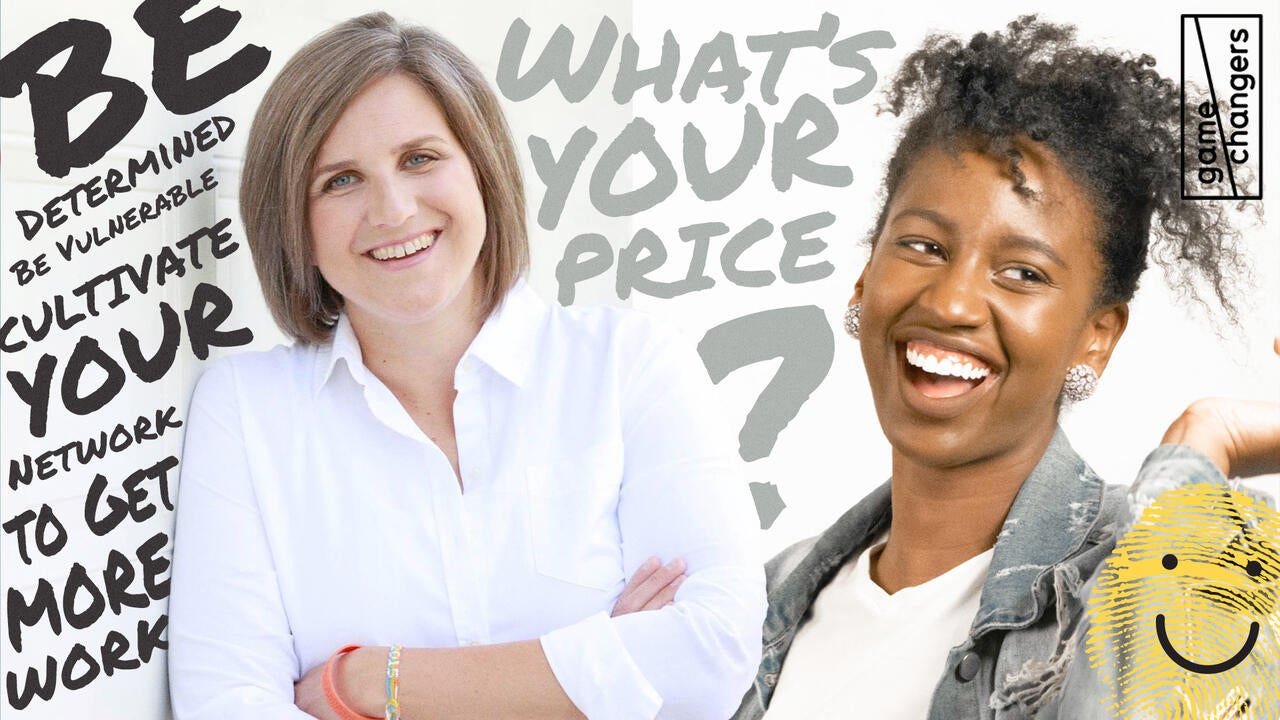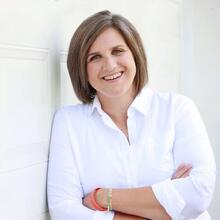
Career perspectives: Become your own boss
Freelance entrepreneurs discuss how they grew their client list, the struggle to set prices and why they build personal connections in their networks

Freelance entrepreneurs discuss how they grew their client list, the struggle to set prices and why they build personal connections in their networks
By Anne-Marie Marais and Karlena Waugh AlumniWelcome to Career Perspectives, where we share a conversation between two Waterloo alumni. In this conversation, Anne-Marie Marais (BES ’95) and Karlena Waugh (BA ’14) discuss their experiences as freelance entrepreneurs. Anne-Marie offers digital marketing services through her business Long Legs Media, and Karlena is the events and community-building expert behind Mini K Creations. The services they offer may be different, but many of their experiences are same.
Read on to discover how their businesses have grown, how their client lists have changed and the continual challenge of pricing.
 Karlena Waugh (BA '14), founder of Mini K Creations and The Biz Mixer.
Karlena Waugh (BA '14), founder of Mini K Creations and The Biz Mixer.
Karlena: After 12 years of being an entrepreneur, I’m sure you have learned a lot about your industry and a lot about yourself. I know I have.
I'm just getting to the point where I know what space I want to be in and what I’m going to thrive at. It’s a discovery, like anything else in your journey as a business owner – you learn a lot about yourself along the way. It will show your strengths; it will show your weaknesses; it will show your fears; it will show the things that you're excited about. You’ll be exposed and vulnerable because you can't hide under a title or a company. It’s just you and you are the face of your company. You really have to be self-aware.
Anne-Marie: Yes! It takes a lot of drive and determination to constantly think, “What's the next thing I'm going to do?” And a lot of determination to stick with it.
Yesterday I woke up with a horrible headache, but that doesn't matter. It’s not like I can just say, “Sorry, client. I'm feeling under the weather, so no work today.” You can’t call in sick. But on the other side, you also have the benefit of taking Tuesday afternoon off and working Saturday instead.
 Anne-Marie Marais (BES '95), founder of Long Legs Media
Anne-Marie Marais (BES '95), founder of Long Legs Media
That’s what I love about being a business owner. There is some freedom that you don't get from a typical nine-to-five. You just have to commit, right? You can’t go into entrepreneurship thinking you'll get a nine-to-five job.
Karlena: Yeah, I think it's interesting when people focus on the idea that they’ll have more freedom. You will, but you’ll have a lot more responsibility too.
Anne-Marie: Right. Because at the end of the day, you do have that freedom. You could choose to not be responsible, not prioritize your clients. But your business won’t get anywhere.
Karlena: It sounds like you’ve done a really wide range of work over the years. What are you focused on now?
Anne-Marie: I've done mostly digital marketing and social media marketing. Today, with my biggest client, I work with them on multiple projects. Three years ago I started with one particular project, and I’ve been able to evolve and take on new areas of work with them. It's been good and they're an amazing client.
ANNE-MARIE MARAIS (BES '95), founder of Long Legs Media
I want you in my network because I can speak positively about the work we did together, and you can do the same for me.
Anne-Marie: But not all clients and projects are like that. I’ve worked with companies and industries that I don't appreciate. I’ve taken contracts to build my experience, but after four months I thought, “I have no interest in this industry. I have no interest in working with that company or person ever again.”
I know that sounds sort of harsh. Some people would say that you always have to grow your network. And you do, but you also have to make sure that you appreciate your network. I want to speak positively about the work we did together, and you can do the same for me.
Karlena: When you’re in the beginning stages, you really have that focus on your bottom line and taking new contracts. It’s hard to say no to anything. That client might be really difficult to work with, but you need the money and you need the experience. After doing this for a while, I’ve also realized that it’s important to be intentional about how you build your network.
My business growth has been driven by my network. People talk about portfolios and having a website, but I think the best clients I've ever found have always come from my network. When you talk about how you want to be able to speak positively about each other, I think you’re really talking about the referral.
KARLENA WAUGH (BA '14), founder of Mini K Creations & The Biz Mixer
People talk about portfolios and having a website... but I think the best clients I’ve ever found have always come from my network.
Anne-Marie: Yeah, I completely agree. I would say that my portfolio is my network. That's what I show off. I could have a portfolio where I link to things that I've done, but for me it's about the people I worked with.
When I’m looking for more work, I reach out to my network. It can be a post on your LinkedIn saying, “Hey, I've got some time. Anybody have digital projects going on?” And then you can reach out individually to people within your network, invite them to have a coffee and catch up. And maybe when you’re together you can let them know you have extra time.
To me, the most important thing is building a network that actually knows you. Then, you know there are people who will think of you when an opportunity comes up. Once you get that introduction, you can show off what you know and what you’ve done.
It’s also important to reciprocate for your network. My connections are to be shared.
Karlena: Yeah, it's so true. Being that resource in your network is important. You can be someone who just networks to build numbers and to expand, but being a connector is more valuable. It lets people know you're willing to show up for them. It provides abundance in your business and in your network, so people are willing to give back to you. That's when you find the best clients.
KARLENA WAUGH (BA '14), founder of Mini K Creations & The Biz Mixer
Being that resource in your network is important. You can be someone who just networks to build numbers and to expand, but being a connector is more valuable. It lets people know you're willing to show up for them.
Anne-Marie: Oh yeah, I completely agree. I actually love that part of my career. If I can help somebody else get a connection, it makes me so happy to think that my network or my friendships helped them. I have a feeling that you and I are similar in this regard – not just in our work but in our personal lives – we're probably the connectors. We're the people who keep others connected.
Karlena: Yeah, I am definitely a connector. Once you realize that is a part of your purpose, everything starts aligning. Play to your strengths and be a resource. I’m definitely the friend who people ask, “Do you know someone?” And often I do.
Anne-Marie: I also wanted to talk about the other side of being an entrepreneur. What are some of the things that you don't like or find difficult? Maybe it’s administrative stuff?
Karlena: How did you know? I wish I could clone myself, and get my clone to do all of the admin emails and invoices!
I find that it’s been important to realize what my strengths are, what my weaknesses are. What I really love doing in my business, what I don't like doing. I’ve had to figure out how to do less of the things I don't like doing. Maybe that's getting an intern or part-time employee on board, or just outsourcing.
KARLENA WAUGH (BA '14), founder of Mini K Creations & The Biz Mixer
Admitting that you’re not the greatest at doing taxes or bookkeeping, or that you’ll forget to email people back — that makes you better.
Karlena: It’s easy to think, “I'm the business owner, so I'm the one-woman show. I run everything.” But when you get more clients coming in, you're not able to do everything well. You will quickly find out that you need help. Admitting that you’re not the greatest at doing taxes or bookkeeping, or that you’ll forget to email people back – that makes you better.
For example, I like calling clients, but discovery calls mean that I have to email an invoice afterward.
Anne-Marie: And then probably chase it down.
Karlena: Yeah!
Anne-Marie: That’s the frustrating part of entrepreneurship for me. That conversation where you say, in the nicest way, “So, just checking in about that invoice I sent you three months ago.”
Because you do have to chase clients down sometimes. I’ve also had clients tell me, “Well, things are tough right now.” But you have to stand your ground. They hired you, you’ve done the work. I’ve had to have some difficult conversations.
Anne-Marie: Years ago, I was working for a big company and they brought me in full-time on a contract. I gave them a rate based on the fact that I was getting full-time hours, so it was lower than usual. I worked for that company for five years, and my hours eventually decreased until I was working five hours a week. The income wasn’t ideal anymore, but for me to bring it up to my actual rate was virtually impossible. I started too low, and I had kept it too low as they decreased my hours.
ANNE-MARIE MARAIS (BES '95), founder of Long Legs Media
My rate isn’t exactly the same for everybody because it depends on how much work you’re giving me, or the type of work.
Anne-Marie: It’s a really tough thing to go in at a rate that is reasonable. My rate isn’t exactly the same for everybody because it depends on how much work you’re giving me, or the type of work. You have to find that balance right from the beginning. If you go in super low just to get the job, you’re never going to dig out of that hole.
KARLENA WAUGH (BA '14), founder of Mini K Creations & The Biz Mixer
If the client’s budget is 50% less than what you would expect for full-service, you can reduce the task list to be 50% less … It’s providing the same quality of work, just adjusting the amount of it.
Karlena: Yeah, you’ll never get out. I think it comes down to knowing what your worth is and standing by it. I do a lot of mentorship with the younger entrepreneurs, and I am always reminding them: don't discount your value, discount the work that you're doing.
You're going to provide the same level of expertise and value regardless of the pay. If the client’s budget is 50% less than what you would expect for full-service, you can reduce the task list to be 50% less. That is not devaluing your expertise or worth. It’s providing the same quality of work, just adjusting the amount of it. If you’ve taken one project at a price below your value, it’s very difficult to charge your usual rate the next time. It’s hard to renegotiate when you've shown them how low you’re willing to go.
Anne-Marie: It’s intimidating to see what others are charging. I've worked with people who are charging double my rate, and I honestly don't know what they do that’s different from me. Maybe they just have a stronger ability to stand by that rate.
In theory I'd love to ask for that rate, but it's not realistic. I also think it's important to find a balance because you want the work to continue. Take our current situation with COVID-19: budgets are tight and certain contractors may have been let go because their rate is too high.
I try to keep myself within a certain range. If I'm making good enough money, if I'm surviving and can still put money in savings – then I’m okay. But there are people who are not okay with that, and they may be hit harder when things get tough.
Karlena: Yeah, especially in service industries. Everybody's charging something different or offering a different scope of work.
One thing that I've tested over the past year is deciding what my “scary number” would be for a project – one that that makes me a little bit like sick to say. Sometimes, when I say that number, clients don't even question it. And I think, “So, I could have charged more?!”
Anne-Marie: Yes! When they just quickly agree, I always think I could have said double.
But it could go the other way. I’ve gone in high before, and they go silent. Then you start wondering, “What did I do?” You try to let them know they can still negotiate, but some people just don't want to do that. If your initial price is out of their budget, they’ll decide to find somebody else.
You have to understand that they may walk away. And hopefully you've got two other options in your pipeline. You can’t have all your eggs in one basket.
ANNE-MARIE MARAIS (BES '95), founder of Long Legs Media
You need to have feelers out there all the time. If you’re dependent on one client for your income, you’re in trouble.
Anne-Marie: You need to have feelers out there all the time. If you’re dependent on one client for your income, you're in trouble. I will admit that right now, the majority of my eggs are in one basket and it’s making me uncomfortable every day. So I constantly have these conversations going with people in my network.
This is what I tell people who ask me how to find clients: it’s about relationship building. It doesn’t have to take a lot of effort. If there’s a group of 10 people that are very important in the area you want to work, then drop them a line every quarter. If you come across something that might be interesting for a project they’re working on, just send it. Then you’re top of mind.
How can you stay top of mind in between projects? Anne-Marie and Karlena suggest:Send an article or information that’s helpful to their work.
Catch up with your best contacts over coffee.
Celebrate clients and finished projects with a LinkedIn post.
Karlena: That is so, so true. It’s really just about being top of mind. I just did this on LinkedIn the other day. Someone posted a book, and I sent it to someone who I really look up to. I was like, “Hey, I thought of you when I saw this book recommendation. It reminded me of the work that you're doing.”
It can be as simple as that, and your contact knows that you’re looking out for them. If you cultivate that relationship and continue to provide value in a way that isn’t self-serving, they could be a key player in your future. It’s really important for your growth right now and also for that growth in the future.
Anne-Marie: I think that you make a really good point about the future. It’s such an important thing being an entrepreneur – you can't just focus on today. You have to be thinking about today, tomorrow, six months from now, a year from now.
A traveler and a friend, Anne-Marie’s creativity stems from keeping her eyes wide open as she experiences the world.
Anne-Marie Marais (BES ’95) has over 20 years of marketing and project management experience from traditional to digital, for brands like the Four Seasons Hotels and Resorts, The Globe and Mail, Bell Canada, AOL Canada and the Toronto Star.
As the digital world has grown, so has Anne-Marie’s expertise. From the early days of digital marketing to the current ever-changing landscape, Anne-Marie is ready to take on all the challenges and opportunities of Long Legs Media clients.
Anne-Marie has been running Long Legs Media since 2008 and has had the opportunity to support many small to large businesses as they work to launch and grow throughout the various the digital platforms.
With her mobile office found in her backpack, slung on her shoulders, the one other item Anne-Marie has close at hand is her trusty passport, as one of her life passions is travel. You can find her travel articles in publications like the Toronto Star and on her travel site, Long Legs Travel.
Anne-Marie finds great joy in supporting her community with the volunteer work she does including being the Co-Leader of the Toronto Chapter for UW Alumni. And her love of travel introduced her to the Welcome Team at Toronto’s Pearson Airport where she has been a volunteer helping travelers for the past 3 years.
Karlena Waugh (BA ’14) is a millennial entrepreneur who is passionate about community building and collaboration. With a diverse background in student affairs and over 10 years of experience in building strong communities, Karlena utilizes these skills to effortlessly build rapport with clients, create a sense of community and nurture strong business relationships.
Through her event planning company, Mini K Creations, Karlena aims to create memorable experiences for her clients and spaces for entrepreneurs to showcase their businesses and build relationships across industries. She also hosts The Biz Mixer, a monthly event and community for young creatives and entrepreneurs to connect, learn and amplify their businesses. Get updates on events and join the community on Instagram: @thebizmixer.
Multi-faceted by nature, Karlena is also a speaker and host, as seen on CBC Our Toronto, Queen Series Podcast, Toronto Professional Women Meetup, FuckUp Nights Toronto, The Canadian Side Hustle and Business Podcast, & Xero Accounting's Small Business Series (to name a few!). She also hosts a monthly event and community for young creatives and entrepreneurs to connect, learn and amplify their businesses.
When Karlena isn’t producing events, she is a facilitator with an organization, Girls of Destiny, whose aim is to provide mentorship for teenage girls within the community.

Read more
HR professionals discuss working in tech, the power of your personal network and the value of an arts degree

Read more
How two alumni started a company together ... eventually

Read more
Four alumni recommendations to advance your career
The University of Waterloo acknowledges that much of our work takes place on the traditional territory of the Neutral, Anishinaabeg, and Haudenosaunee peoples. Our main campus is situated on the Haldimand Tract, the land granted to the Six Nations that includes six miles on each side of the Grand River. Our active work toward reconciliation takes place across our campuses through research, learning, teaching, and community building, and is co-ordinated within the Office of Indigenous Relations.